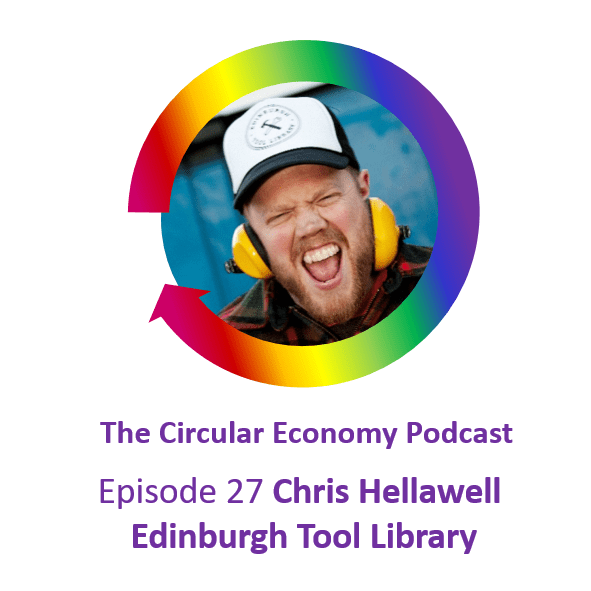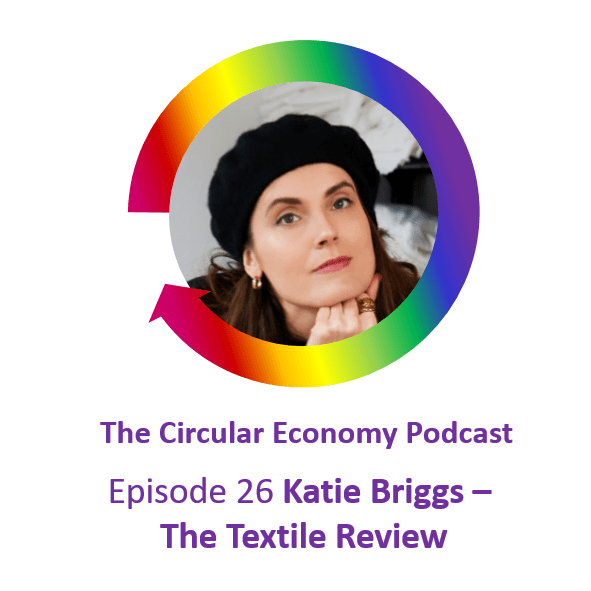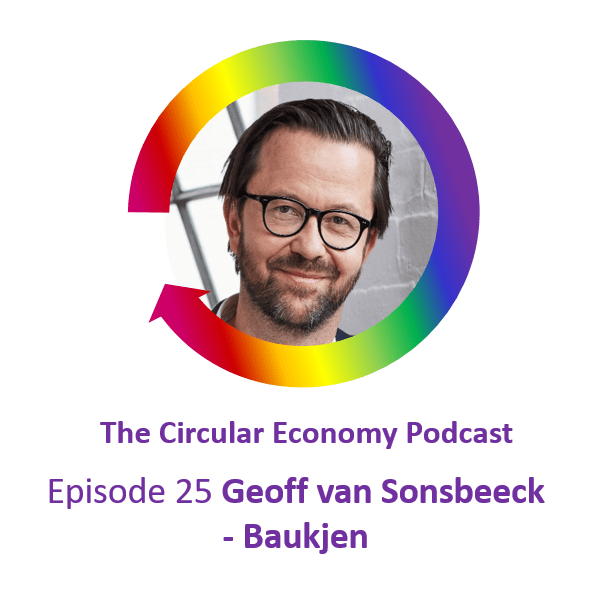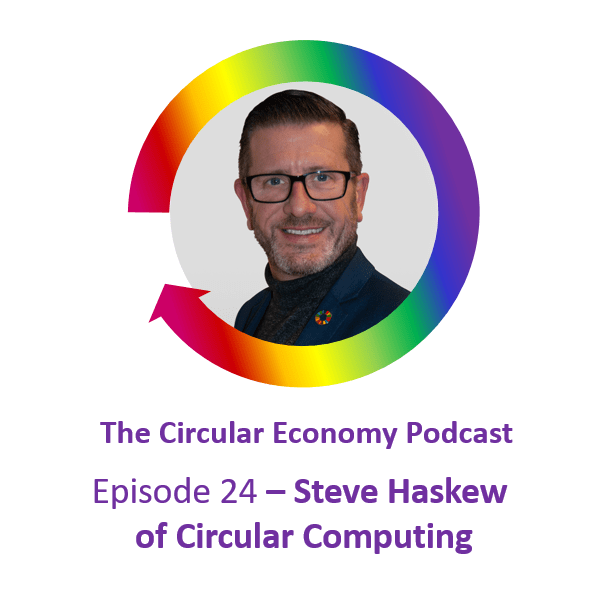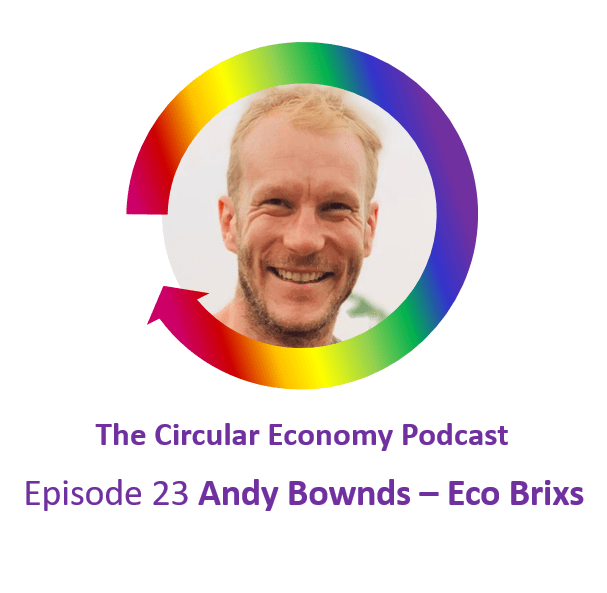Podcast: Play in new window | Download
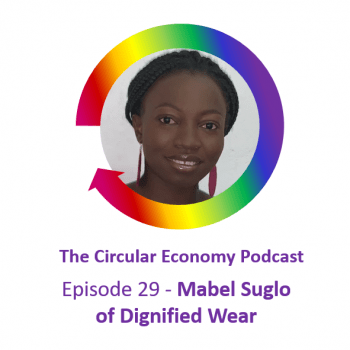 We talk to Mabel Suglo, the founder of Dignified Wear, a social enterprise in Ghana. It aims to economically empower people with disabilities and rural women through decent jobs. It trains and then employs them to handcraft durable, versatile and fashionable shoes, handbags, locally woven fabrics, clothing and traditional jewellery.
We talk to Mabel Suglo, the founder of Dignified Wear, a social enterprise in Ghana. It aims to economically empower people with disabilities and rural women through decent jobs. It trains and then employs them to handcraft durable, versatile and fashionable shoes, handbags, locally woven fabrics, clothing and traditional jewellery.
Podcast host Catherine Weetman is a circular economy business advisor, workshop facilitator, speaker and writer. Her award-winning book, includes lots of practical examples and tips on getting started. Catherine founded Rethink Global in 2013, to help businesses use circular, sustainable approaches to build a better business (and a better world).
Stay in touch for free insights and updates…
Read on for a summary of the podcast and links to the people, organisations and other resources we mention.
You can subscribe to the podcast series on iTunes, Google Podcasts, PlayerFM, Spotify, TuneIn, or search for “circular economy” in your favourite podcast app. Stay in touch to get free insights and updates, direct to your inbox…
Links we mention in the episode:
- Catherine’s blog on social entrepreneurs in Africa – Transforming plastic waste into social value https://www.rethinkglobal.info/plastic-waste-social-value-africa/
- Podcast Episode 23 features a circular social enterprise in Uganda: Andy Bownds of EcoBrixs: creating social value by recycling waste plastic into construction materials https://www.rethinkglobal.info/episode-23-andy-bownds-eco-brixs/
- You can find Mabel Suglo on Facebook, Instagram and LinkedIn with Mabel Suglo.
- Also on twitter @SugloMabel1
- Dignified Wear on Instagram https://www.instagram.com/dignifiedwear/
- Dignified Wear on Facebook https://web.facebook.com/DignifiedWear/
- Dignified Wear on Twitter https://twitter.com/dignifiedwear
- Dignified Wear on LinkedIn https://www.linkedin.com/company/dignifiedwear
- Dignified Wear website dignifiedwear.com
- Books and other companies
- Prince Agbata of Coliba in Ghana coliba.com.gh
- Chineyenwa Okoro Onu of Waste or Create in Ghana www.wasteorcreate.com
About Mabel Suglo
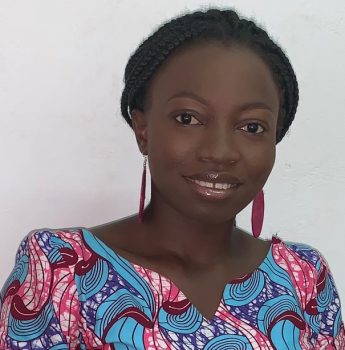 Mabel Suglo, through the inspiration from her late grandma, who had leprosy and with barely a thumb defied the odds of single motherhood, stigmatization and marginalization to cultivate food crops on a piece of land to feed her children and grandchildren proving that disability is not inability inspires her to economically empower persons with disabilities and rural women in Ghana through decent jobs through her social enterprise Dignified Wear.
Mabel Suglo, through the inspiration from her late grandma, who had leprosy and with barely a thumb defied the odds of single motherhood, stigmatization and marginalization to cultivate food crops on a piece of land to feed her children and grandchildren proving that disability is not inability inspires her to economically empower persons with disabilities and rural women in Ghana through decent jobs through her social enterprise Dignified Wear.
An enterprise based in Sunyani, the Bono Region of Ghana, Dignified Wear trains and employs the physically challenged and rural women to handcraft durable, versatile and fashionable shoes, handbags, locally woven fabrics clothing and traditional jewelry. These are made from recycled tires, scrap fabrics, cotton threads, recycled glass and plastic bottles. To inspire the communities in which they live to be creative about reusing materials, extending their lifecycle and at the same time contribute to waste reduction.
She is an international award winning social entrepreneur with many accolades around the world including that of His Excellency Nana Akuffo-Addo, the president of the Republic of Ghana.
She has been featured on both local and international media such as BBC, CNN and Huffington Post.
She spends her free time mentoring girls to inspire and develop their leadership and entrepreneurial skills for the development of their communities.
Transcript
Welcome to Episode 29 I’m recording this on the fifth of June and here in the UK. We’re starting to ease out of the 11 weeks of lockdown. There many are worried that we don’t yet have a way to control the spread of Coronavirus. I hope you and yours are staying safe and well. First, my apologies for the messed up release of the last episode with Chris Diplock, in Canada about the Thingery. I managed to publish it with the audio from Episode 27 interviewing Chris Hellawell in Scotland about the Edinburgh Tool Library….! If you’d already downloaded the episode like me, you may have to delete it and go back to the series to download it again. It’s a great conversation, and the theory is a brilliant way to create a library of things in your own town.
In this episode, we’re talking to Mabel Suglo, a social entrepreneur in Ghana. Mabel’s grandmother suffered from severe leprosy and as a child, Mabel was all-too-aware of how difficult her grandma’s life was, with everyday tasks like carrying water back to the house being a major challenge. As an adult, Mabel was shocked by seeing a disabled person being insulted for begging. And that led to her determination to do something to help those people have proper, meaningful jobs. And to break down the stigma around disability. The sound quality comes and goes a bit as we both struggled with under pressure broadband, Mabel recommend some other social entrepreneurs, and I repeat those names at the end.
In today’s episode, I’m talking to Mabel Suglo, the founder of Dignified Wear, a social enterprise in Ghana. Dignified Wear aims to economically empower people with disabilities and rural women through decent jobs. It trains and then employs them to handcraft durable, versatile and fashionable shoes, handbags, locally woven fabric clothing and traditional jewellery. It uses circular economy principles to turn waste into value, with products made from recycled tires, scrap fabrics, cotton threads, recycled glass and plastic bottles. Dignified Wear also aims to inspire communities to be creative about reusing materials, extending their lifecycle and at the same time, reducing waste and pollution. Mabel is an international award winning social entrepreneur with many accolades from around the world, including from the President of the Republic of Ghana, and she’s been featured on both local and international media, such as the BBC, CNN and Huffington Post. Mabel, welcome to the circular economy podcast.
Mabel Suglo Thank you, Catherine.
Catherine Weetman How are things in Ghana right now?
Mabel Suglo 03:54
Okay, so well, we happen to be in a world health crisis right now that is affecting many countries. So we have been home and not having a lot of work to do outside but working from home and all those kind of things. So yeah, we’re just keep me safe and bring all this passes and we become free again.
Catherine Weetman 04:22
Hmm. So you’re in you’re in lockdown as well. Everybody’s staying in.
Mabel Suglo 04:26
Yeah.
Catherine Weetman 04:27
So does that mean that Dignified Wear isn’t working or are able are people able to work from home?
Mabel Suglo 04:35
Um, so there are aspects of the business we can do from home like the beading, and then there are aspects that we need to get to the shop to do, but we are currently not doing a lot of assembly right now on a daily basis. We just try to data and number of them and then one person who gets the whole thing than me is sort of all of us To get out to minimise the spread or Yeah, the effects of the virus? Yeah.
Catherine Weetman 05:07
Yeah, it’s difficult, isn’t it? We’re, we’re into week four, I think it is of lockdown now. And people are being generally very sensible. But there are lots of concerns about, you know, lack of face masks and equipment and how particularly small businesses are going to get by, even with quite a lot of support from the government. You know, it’s, it’s, there are a lot lots of difficulties and questions about how it’s going to all pan out. So having been inspired by your late grandma to do something, how did you set about starting the business? What did you decide to do first?
Mabel Suglo 05:51
Okay, it’s a good day’s special for my late grandma mom who had a single time, due to her leprosy condition and being a single mom is defined also, with my position and my realisation to feed and cultivate food crops or feed a piece of land to feed her children and grandchildren, proving the fact that disability is my inability, I decided to economically empower persons with disabilities and rural women here in Ghana, who are over 5 million, of which 25% of them constitute they the physically challenged to be financially independent and take ownership of their life. So how I do this is by walking onto the street interacting with them, those that want to come on board, I picked them up pay for the training for them to get trained in how to make these shoes and fashionable accessories. And then we intend to employ them to be our workers so that they would be able to ear decent livelihoods. More than what they were earning on the street, and to contribute to long term financial freedom.
Catherine Weetman 07:07
So you started with the idea of making shoes and sandals Is that right? And did you start off using waste materials or did that come later?
Mabel Suglo 07:21
So I started with using with materials from the story of my you know, PA, Paramus in the Upper West region of Ghana was new wear shoes made of car tyres too challenging, we’ll be able to pick through them. So I just decided to pick up from whatever I saw in my community or whatever way upon the team to work on with submit as possible because those who want to operate like the big players in the Industry already so we started with these tires. People would get some of them in their home, sometimes we go pick them then we work with them, but right now offer them some money to get from people’s homes as well as get them to organisers and as happy as builders as well. Yeah.
Catherine Weetman 08:25
So just so I’m clear on that. Do people collect that your employees collect the tires themselves or people in the community bring waste resources that they think you can use?
Mabel Suglo 08:38
Yeah, people bring them because as I said, I’m working with challenged people. So their mobility is kind of restricted. So we, in our community, people know that we work with sec material, so they come to get give it to us and then we pay them all. Personally, we go around and pick them because I have some other part time youth that are on the streets doing that. And so when I said when I need them, I let them go around for it or when somebody says, Well I have this car tire, I’m just like, I need to drop it off. Will you be interested in them? If it is that kind of one you go pick it up, and then all the odd scrap yards, he is Giuliani where they send these tires to be sold. Yes. So that’s how we pick them up.
Catherine Weetman 09:32
And over the over the years, you’ve evolved the business to make other products. So you started with shoes. And now you’re making from what I can see on the website. There’s a quite a range of bags, of jewellery and accessories, clothing, that kind of thing. How, have people, have your employees brought those ideas to you or have you looked at you know what, what other waste materials are there, and what can we do with this? How has that evolved?
Mabel Suglo 10:04
So, the evolution came as a result of two things, the demand by my customers and secondly to promote the African identity and culture out there while still operating on our core value of recycling with materials. So if you look at those as jewellery and accessories that we have on our website, they are traditional and they identify with the Ghanian community and they are made of other waste materials as well. So when the opportunity was presented to us by our customer, because we all issues with the scrap fabric, which was also a kind of African thing because of the kind of fabrics you used to use. People will go like, Oh, I would have loved to have this with maybe this kind of accessory, or I’m gonna use it to attend a wedding or a naming ceremony, or that kind of thing. And because these are all cultural events, so we just decided to tap into the idea of serving the need, which is to look cultural, yet seven, the added need of cleaning up our environment as well, which was still in line of our visions and our values as a business. So that is why we just decided to tap into those products diversification and above all, it was going to create more employment for other marginalised groups like who are women and then the fiscal challenge as well. So does the more reason why that’s how can we evolve then I wouldn’t say I’ve regretted it, it is a nice thing, because it’s helping as many bad things as creating much more impact.
Catherine Weetman 12:06
Mmm,yeah, that sounds good. And have you found that over the years you’ve been running the business, as you providing employment and cleaning up the waste and engaging with the community – have you found that that’s reduced some of the stigma associated with being disabled? Has it changed people’s mind?
Mabel Suglo 12:28
Yeah. So yeah, it has changed people might, because that was one of my greatest selling, of initially having to work with this person with disabilities because you know, he in Africa, you always perceive those people to be like born of evil spirit or the occurs or that kind of show me that they guess. And so, when I set out, I tried using the two approaches, I would tell somebody that will disagree. Would you like to buy? They go “yes it’s beautiful, it’s colourful” and all those things but when I follow up that is made by persons with disabilities, you see that kind of, they would try to withdraw and I went like no these people are just like you and I it’s just takes an acid you also do we all have some form of duties just that it doesn’t show because if you really want to be a total well being you have to have a state of correctness in your mind your body your everything but at this point of time if you are stressed so like so like you are not physically hold at any point in time. So let’s go look at them with the native lenses but let’s look at them with the kind of impact they are created because you are the people saying these people are embedded in society because they are always begging for your money anytime they see you. But here the kids if you grant them the opportunity to produce something for you to buy off which I’m offering to you right now. And if I’ve not even told you that this product is made by an abled person, so why are we trying to really get them to the background when they are equally able just ask me You and I are. So with over the years dedication has helped people to get over that kind of stigmatisation and the way the government is right now. Trying to put them on the spotlight in old support them is making a lot of people get to know that it’s high time we celebrate and embrace them include them shall instead of trying to to midnight, yes, the challenges are still there but is now we mode more minimal because when they come to the site and they see them working and sometimes they come to see the addresses of the people we are shipping these people to we are shipping the products to people in New Jersey, San Diego and all those things. I went I always say that when this, I say to the disabled people, this should make you feel proud because you are here in Ghana and seeing me making something that is transcended and moving over nations and continents and oceans to get to someone that is tied, and he’s happy about what you’re doing. So you should have some self esteem and self worth for yourself. And then other customers that you come by. I said, Well, this way the people we are trying to put behind the bus for No, no crime of yours, because as you can see, this is what they’re doing. And this is the kind of calibre of people that are interested in their craft. So we should first of all, give them that opportunity instead of always trying to make them look the bad when in our class, and we are the bad people here because we don’t want to give them that opportunity.
Catherine Weetman 15:52
Yeah, that’s a great point. And it reminds me of a song, you may or may not be familiar with it, but it was used a couple of Olympics ago. The M People song, ‘what have you done to make today to make you feel proud’ that, you know people can be proud of, of buying those products and, you know, supporting your social enterprise and supporting reducing waste and repurposing waste into value and also supporting the traditional crafts. And the people who are making the products can be proud that they’re contributing to exports and contributing to the local economy. And there’s just a whole range of reasons to be proud of all sorts of aspects of the business. So when you were trying to get it going, what were the main barriers and challenges you know, did you did you find it difficult to get funding? Did you find it difficult to get equipment? What were the main headaches for you?
Mabel Suglo 16:52
So initially, it was to gain the trust of my disabled workers, because I’ve had almost all of them that I take through this kind of motivation session before they actually get to work to make them understand that they can do this, they are the they are equally they are determined and they are what is. So most of them already see that? Well, we only hope you are not one of those that are trying to take advantage of us and do an advantage of it. So it was pretty difficult to gain that trust initially because how can to work together if you don’t agree so, but I overcame that challenge with my first employee Kins Ford, who I’ve worked with through the years, I guess we’ll bring him in and say well look at paying for these with me all this year. So if I wasn’t really into do something good, I don’t think he would still be here by now. So he would know how to talk to them and let them understand that we are I truly mean in business, we mean what we are saying, and it’s up to them to drain us, or just decide to sit back and let fate take care of them. So that was the first challenge. And the second challenge was the access to funding to buy the basic tools and machinery to use in the production. And but that’s I had to, I did take care of using my savings from school, and that of my, my mommy and my big sister, because they are more like the big funders or investors in my business, because it’s from their monies have been able to do a whole lot of things of which I want to tell them that I’m really grateful for. Yeah, so because I didn’t really know anything about grants. I didn’t know anything about like business competitions and pages and all those things. It has to take me quite some time in years to learn how to do this. Yeah, so funding and gaining the trust of my people and even quite afraid was excellent, because when I started initially I was in Kumasi. And then later on, I finally had to relocate here to Sudan. So all those things were a challenge because of the changing phases of my life as a student that’s supposed to men to make their parents proud, and at the same time, create employment or source of livelihood for the less privileged in the society. And now we are all set for this journey for good. And then we, even though we’ve not acquired all the type of machines we need, because of the increase in demand, and they kind of could feature with us we want to offer even though it’s too good to be in the line of repurposing waste. We need some kind of sophisticated gadgets to do that because right now we do all our production by my normal Using our hands, no machines inside, there are only tools we use to help us do that as their users so that we can cut and get fine finishing and all those things. Yeah.
Catherine Weetman 20:12
So it’s very much relying on traditional tools and, and, and views resources then. So that’s amazing that you have to start with, you know, build building trust, it starts from the fundamentals doesn’t have you know, why should you trust me? And how am I going to help you move your life forward? That’s quite kind of an existential question for the first the first was even before the first days of work, isn’t it is kind of convincing them to even trust you enough to get started. And what are your plans next, maybe what what are you hoping to do next with the business? Is it new products? Is it more export markets? What are you thinking of?
Mabel Suglo 21:02
So right now we thinking of getting out into the European and American market, the more to export. And as well as we are not going to add many more products in this because yeah, we’re now trying to even zero in and produce a perfect thing, because I think we have it all right now as you figured out what we really want to do, which is one, create employment for the marginalised community too upcycle and make our environment much more cleaner and we promote the African or the Ghanian culture today, international world or the culture of any nation or country we happen to work in because that is a global goal as we go up and kill into other nations and countries as well. So you’re looking at Get Rich and much more customers and market to export getting many more retail partners in Ghana and abroad, so that our products can reach many more customers to make more impact and at the same time increase our revenue which is like more in the Civic sustainable and then we are looking at employing this marginalised people who want to be that kind of organisation that once they are because their unemployment rate is way more like in 0.5 higher than the unemployment rate for the ABLE person gained and so we want to be that go to institution they can always call on the club to to get something doing, what do they do today, the discrimination the oldest face when it comes to being employed. Due to the fact that they are either not highly educated or people are just have this perpetual cycle may sound bad about them, which is actually not any fault of yours. We want to be that institution that would employ them to know that all they need is self motivation and determination to succeed with your hands. Yeah, not to go in and get some degrees and whatever that would mean get them the unemployment rate. So that we are looking out to now we can make many more market seven more many more customers, and then employ many more solid talent files to be dealt with in business and ethically questionable issue or this ambition to be
Catherine Weetman 23:44
excellent. Well, that sounds like sensible aims for, you know, continuing on the successful path that you’re already on. And just spreading the benefits to more to more people. That’s excellent and may What would your top tip be for anybody wanting to start a circular economy business or a social enterprise?
Mabel Suglo 24:08
So Well, it’s simple, I guess have these three values or beliefs I’ve been living on all these years. First of all, you have to have the faith. You have to be patient. And then just no matter what happens, never give up. Those three are what I will tell you because I started this in 2008. And as a trainee 27 years down the line, I’ve still not figure it all out. So it takes a great deal of patience to come this far. If not, I there were times this is not all rosy is not all so glamorous as you might feel as I’m talking to you right now. There were times I’ve cried my eyes out like you came to see me When I nearly ran mad and all those things due to pressure and all those things, but I just told myself that well come shine on rain, I’m not gonna give up and today I’m still in this and I’ll continue being in it. Because I will believe that wherever you guessed that, cry out for help whoever is able to help you, you give thanks to God, if you don’t get off course you always get off equally. Because people cannot just offer help to you when you don’t really ask for it or you don’t. So it does have your faith. Tell yourself though, whatever giant you’re gonna face, you face it so it disappears or you disappear, whichever we learned to be patient because people nowadays you’d really think that Oh, the next big thing is becoming an entrepreneur then you become all successful. You build a house, you buy a car, you live a glamorous and luxurious life. All in one month guy, it doesn’t happen that way. You have to be patient you have to go to series of processes to attain that luxurious life. You want to do something you have to do a bit of sacrifice and employee gratification. And no matter what, don’t give up because it’s not what it is remembered why you started at the initial stages. Why did you come all this far in this five to seven years? And you want to just let it cool? Because because of one single challenge, keep on persevering. The challenge with itself, surely handle itself. So just don’t give up no matter what. And here’s what I have to tell you.
Catherine Weetman 26:42
Yeah, never give up. That’s great advice. And Mabel, who would you recommend as a future guest for the programme to inspire people about the circular economy? Yes, so I would recommend a Prince Agbada. He’s the founder of Coliba, a recycling company in India. Ghana and that of Chineyenwa [Okoro Onu], of course is She’s the founder of Waste or Create yes which creates innovation also based here in Accra so those are the two people I think unless of course we want people that are out then I don’t know That sounds great. And if you can share the contact details for those with with me obviously I won’t put that out on the show notes but anything about their websites I can include in the show notes so people can look them up as well.
Mabel Suglo 27:40
Yeah, I will do that.
Catherine Weetman 27:42
Excellent. So Mabel, how can people find out more about you and dignified where and get in touch?
Mabel Suglo 27:50
Okay, so I use the name Mabel Suglo on my LinkedIn, Facebook, Instagram. And Suglo Mabel1 on today. And the business too, you can find it on Facebook, Instagram, Twitter and LinkedIn by the name Dignified Wear. Yes. So you get certified where you can find it in Instagram, our Facebook and our Twitter pages. And our website is www.dignifiedwear (all one word) dot com. So when you get there you will see our contact numbers. You can call us, you can email us, and then you can go to social media handles from there as well. Yeah,
Catherine Weetman 28:46
yeah. And there’s a shop on the website as well isn’t there if people want to have a look at what’s for sale and buy something to support the next phase of your businesses as we emerge from the pandemic luck down. So Mabel, that’s been fantastic. Thank you for giving us all those insights into the journey so far of Dignified Wear. It sounds as if you’re doing some fantastic work and really providing meaning and something for people to be proud of in what they’re making, what they’re buying. Thank you very much.
Mabel Suglo 29:21
Thank you Catherine for the opportunity to be on the Circular Economy Podcast, I’m grateful.
Catherine Weetman 29:29
In case you didn’t catch those other Ghanaian entrepreneurs that may be recommended. They are Prince Agbata with his company Coliba and Chineyenwa Okoro Onu of Waste or Create and their details and website links are in the show notes on circular economy podcast.com. I found that such an inspiring conversation. Mabel’s enterprise succeeds because she found a sweet spot for her local community, resolving pains and creating games, especially for people who are disabled or disadvantaged. She’s combined what her local community needs, meaningful employment and creating ways to use some of the waste materials, causing ecosystem destruction and leaching toxins into the local environment. She does that by helping people learn new skills, and using traditional Ghanaian designs to make desirable products to sell at home and abroad.
I loved how Mabel is challenging existing, entrenched beliefs and prejudices about disabled and disadvantaged workers. The social stigmas run deep with people linking illnesses like leprosy to evil spirits and curses. Mabel broke down the barriers by starting conversations about the products, challenging people as to why the product should be less desirable when they realised it was made by someone with disabilities.
Mabel didn’t pull any punches with her advice for those wanting to start a business, or a social enterprise, as she said, Have faith in your idea, be patient and never give up. She dispelled any ideas that it might be glamorous, untold, there’ll be lots of pressure. It’s highly likely that even after seven years, like Mabel, you’ll still be figuring stuff out. If you’re interested in business with a purpose beyond profit, my latest blog might be useful. I’m exploring how to use the Japanese philosophy of Ikigai to define your business purpose, your ‘why’ you can find it on LinkedIn, or at RethinkGlobal dot info. To find out about other social entrepreneurs in Africa, read my blog from March 2020, “Transforming plastic waste into social value”.
Want to find out more about the circular economy?
If you’d like to learn more about the circular economy and how it could help your business, why not listen to Episode 1, or read our guide: What is the Circular Economy?
To go deeper, you could buy Catherine’s book, A Circular Economy Handbook for Business and Supply Chains This comprehensive guide uses a bottom-up, practical approach. It includes lots of real examples from around the world, to help you really ‘get’ the circular economy. Even better, you’ll be inspired with ideas to make your own business more competitive, resilient and sustainable.
Please let us know what you think of the podcast – and we’d love it if you could leave us a review on iTunes, or wherever you find your podcasts. Or send us a Tweet: @Rethink _Global.
Podcast music
Thanks to Belinda O’Hooley and Heidi Tidow, otherwise known as the brilliant, inventive and generous folk duo, O’Hooley & Tidow for allowing me to use the instrumentals from the live version of Summat’s Brewin’ as music for the podcast. You can find the whole track (inspired by the Copper Family song “Oh Good Ale”) on their album, also called Summat’s Brewin’. Or, follow them on Twitter.
